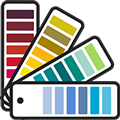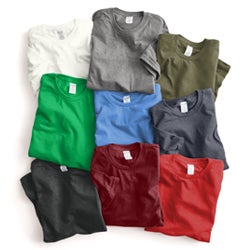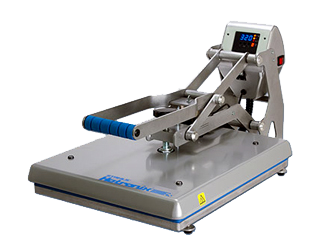The Truth About Direct To Film Printing | Watch This Before You Buy A DTF Printer
Browse Video Categories
Transfer Application | Artwork & Apparel | Easy View Tutorials | Webinars | Ordering Tips | Business | Heat Presses
Hey Friends, Dave here with Transfer Express and today, I want to talk about the easiest way to get into DTF, or direct to film, heat transfers.
It’s a huge buzzword in the apparel decorating industry these days (for good reason) but, just like when direct to garment printers became widely available close to a decade ago, there was a huge rush to buy the equipment and supplies needed, but in the long run, it didn’t pay off for many small businesses.
Here at Transfer Express, we’re coming up on a year of offering our UltraColor® Max direct to film transfers and wanted to dish on some of the challenges this cool new technology brings. Spoiler alert: ordering custom transfers when you need them is definitely the way to go for the majority of t-shirt businesses.
With turn times at just one business day, UltraColor Max typically ships the day after you order it - which is quick enough for 99.99% of t-shirt jobs. There’s also no quantity minimums, just a $25 order minimum, so you can order a little bit or a lot.
Let’s dive into the awesome capabilities of DTF prints, while also talking about some of the aspects of the equipment and process itself that no one else is going to talk about before you buy. Ready? Let’s get direct to it!
Now, DTF transfers are pretty amazing. As far as heat transfers go, they’re really changing the game.
They give apparel decorators full color printing on any fabric or color garment, which is way better than being limited to cotton with direct to garment printers or sublimation limiting you to polyester. There’s no clear outlines, and they have a lightweight, soft hand feel to the touch, very similar to a direct to garment print. They’re capable of outstanding color, great durability and opacity.
Now all of those things, along with durability, come down to the equipment used and the experience of the operator. So, not all DTF is created equal.
That’s not even mentioning the different materials. There’s hot peel DTF (like our UltraColor Max) and cold peel, as well as high and low temperature adhesives, like our UltraColor Max that applies at just 290 degrees. We’ve seen other direct to film transfers with 340 degree and higher press temperatures which limit you on some of those heat sensitive fabrics.
The main thing that’s going to make a huge difference in the quality of DTF prints is the environment and climate of the room where your printer and curing unit will live. We’re talking temperature and humidity.
Without the right environment, you’ll run into print quality issues, like banding in your prints. It’ll look like an inkjet printer running out of ink. When that starts happening, it’s most likely due to ink drying and clogging print heads, which is going to lead to time spent troubleshooting and cleaning and possible replacement parts. That’s no fun when you’re trying to print t-shirts.
Next up on the list while we’re talking about your environment, is the health hazards you’re introducing to your workspace. Curing adhesives can produce some harmful chemicals.
For large shops with proper ventilation systems, this isn’t a problem, but for small, home-based businesses or t-shirt brands running out of a garage, this can lead to expensive and loud vent systems to keep the hazards to a minimum. Even small desktop units may require proper ventilation or personal protective equipment for health safety.
With new technology, and specifically in this post-Covid supply-chain-world comes a flood of low quality print heads, circuit boards and unreliable parts. So it’s important to factor in maintenance to operating costs. Since DTF is so new too, the oldest, most reliable machines are not even 18 months old. Not too much time to put in real-world use testing for a machine that may take years to pay off.
With maintenance, comes downtime, too. That means not being able to produce t-shirts while you’re waiting on replacement parts to arrive, making you scramble for those last-minute orders.
Piggybacking on the supply-chain issues, you may be plagued by inconsistencies in the raw materials you’re purchasing. Bad batches of adhesives, films and even inks have been present, all leading to expensive waste. Not just in time, but if you can’t return the product, it’s money down the drain, too.
Next up, we have to talk about color. Not only do the quality of inks determine your color fidelity, but the environment factors into it, too.
It takes experience tuning the machines and the software to get it just right. Color profiles are a beast of their own… all things you may not have time for as a busy small business owner.
Another point to mention with foreign made parts and electrical components is the UL and CE ratings on the electrical components. These ratings ensure proper testing has been done to ensure the machines meet certain safety standards specific to the region you live in. Please check on any equipment before you buy, and check your insurance policy, some require UL listings for major appliances, some don’t specify.
Essentially, one does not simply purchase a dtf printer and get quality results right out of the gate. Maybe when machine development catches up, with reliable parts and a fully-stocked supply chain it may be more viable for small creators, but you shouldn’t be rushing to integrate production in-house anytime soon.
So, I guess what I’m saying is you should absolutely try custom printed DTF transfers before you decide to take a leap in the huge expense and hassle of running your own printer setup at home or in your business.
Just like with our screen printed transfers, we take out all of the hassle of equipment, inks and clean up so you can just press, peel and profit. With custom transfers, you only pay for what you need, no huge upfront costs, ever.
While DTF printers may look good in videos on the internet, making an investment like that for your business may not make much sense financially. Profit is the name of the game, right?
Here at Transfer Express, we spent years of research and development to bring the highest-quality DTF transfers to market. That, coupled with a skilled maintenance team to ensure quality transfers in every box leaving the shop.
So go ahead, try these UltraColor transfers for yourself and compare it to any other DTF out there, not only in quality, but durability, too. Samples are included in your welcome pack for just signing up for a free account at Transfer Express, or always available for free here.
We’re rolling out helpful tips for all apparel decorators every week, so be sure you’re subscribed to our YouTube channel to stay up to date on the new videos, t-shirt business tips and of course heat transfer inspiration! Until next time, I’m Dave - happy pressing!



















